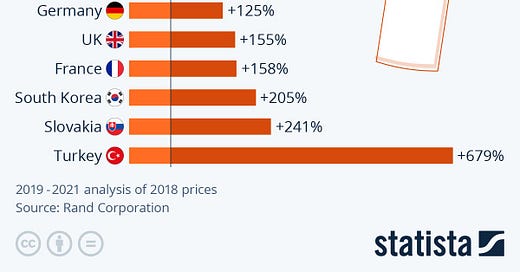Most of us are aware that other countries don’t pay as much as we do for the same drug. In fact, some of us, myself included, have ordered prescriptions in other countries, like Canada, to save money. It doesn’t seem fair that we not only create and produce at least half of all the ethical pharmaceuticals used around the world, but that we pay more for them than other first-world countries.
But President Trump’s solution is wrong.
What is the Problem?
My father worked in the pharmaceutical industry for his entire career, so I have learned a great deal about how it works. In his first job out of grad school, he was a bench chemist at GD Searle, working on finding drugs to treat what were then called “neuroses.” There was no further breakdown, so, very few successful drugs emerged in that area, despite the many years and costs to try to develop them. This is typical. Success had to await more clarity on types of neuroses.
But, one of his fellow scientists invented Enovid, one of the first birth control pills, a success that has given choice to so many women. While an individual pill may not cost that much to produce, to get to the point where you have a drug that is successful in treating a condition AND is safe, you have to develop a great many failures. And, even when you do have something amazing, the years of work to pass the FDA’s stringent protocols costs even more money. During the FDA compliance years, a company loses years off its patent; that is more lost income.
If you’ve bought software, you understand this, in part. A disk, or a download, costs almost nothing. You are paying for the creativity and expert coding required to produce the app. You cannot give away these products without understanding the cost to developing them.
Trump wants the drug companies to slash their prices to Americans, but that would hurt the development of new drugs we rely on to extend our lives or to improve them. There would be a huge decrease in offerings, and likely, promising candidates might get shelved if the cost of bringing them to market is too high. If you are facing dementia with no real treatment, the idea that development will decrease significantly is a big cause for concern. And for those with “orphan diseases,” those where the cost of creating a drug will never be recoverable, they will be the first to lose out. Over the years, the rate of return on R&D investment has been dropping. We can’t try to turn our drug companies into charities. It simply won’t work.
What Should We Do?
The correct solution is to make the rest of the world pay what we pay (or some lesser amount for all of us, spreading the pain around.) It is likely companies offer deep discounts to poor countries, such as in Africa. But why should those relying on socialized medicine, like England and Canada, get a break?
As such, Trump should work with PhRMA to level the playing field with regard to drug costs, so the other first-world companies have to pay the same price as we do. This could be done through tariffs, unless countries are willing to simply pay the fair cost. It’s not the ideal solution, but in the end, if we all pay the going cost, R&D continues apace, and we will all be healthier. There would also be no more “illegal” importing of drugs from cheaper countries and perhaps, many of us might start considering whether or not we “need” a drug or not. That’s just prudent medicine.





Tangentially, I occasionally get rocked by a drug that I need, I.e., inhalers, that my insurance won’t cover or is tiered at a much higher price. I guess this is in the same realm you’ve addressed here.